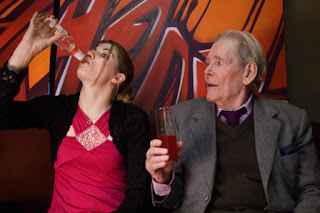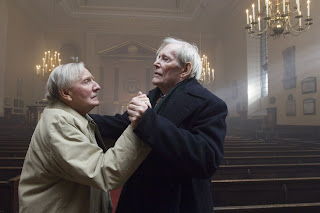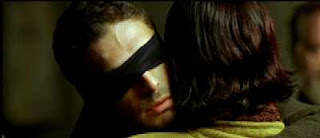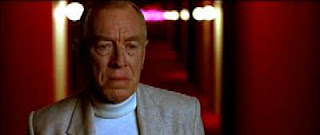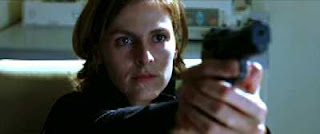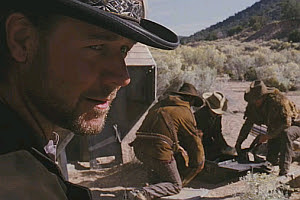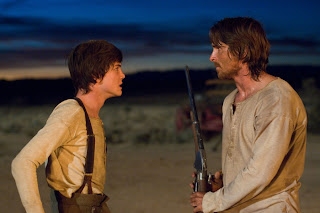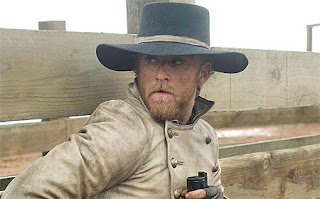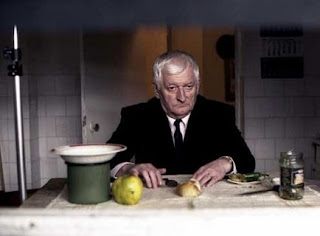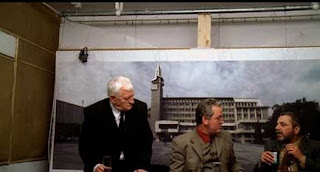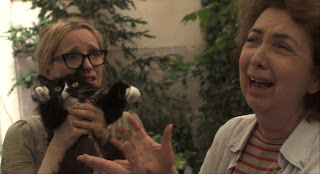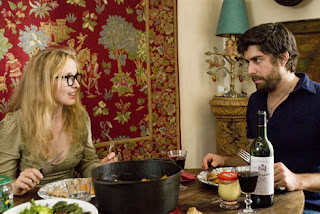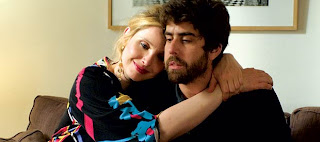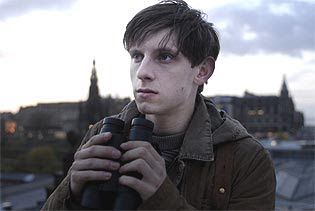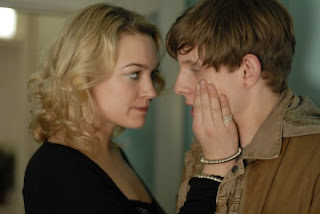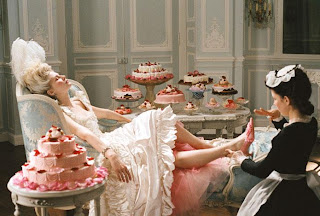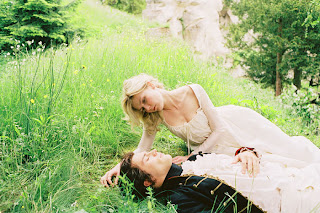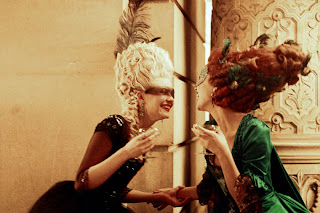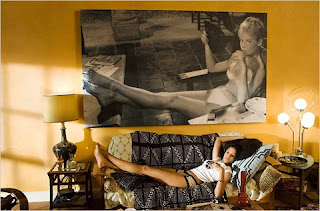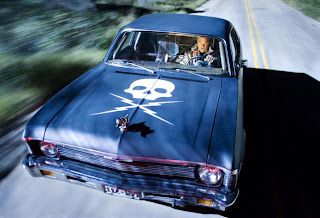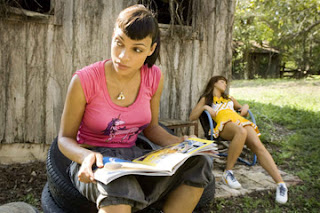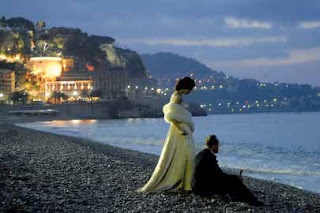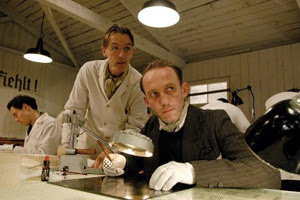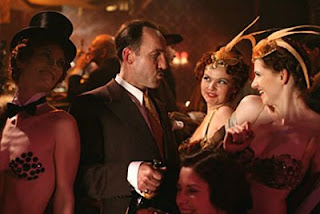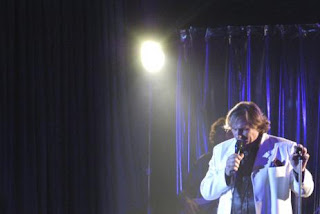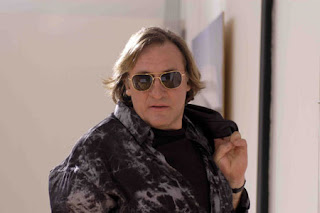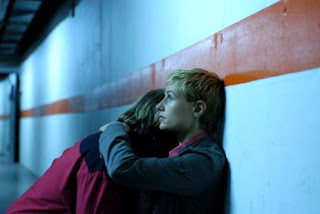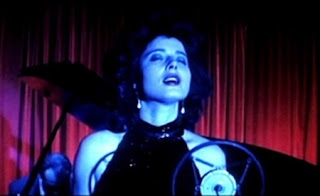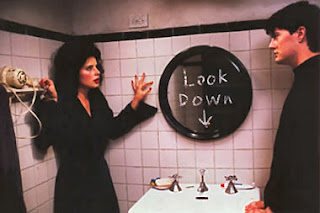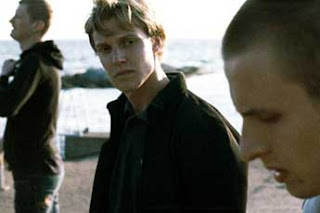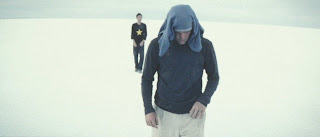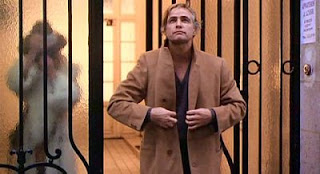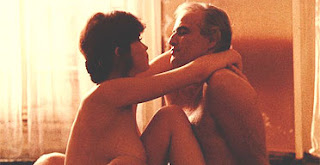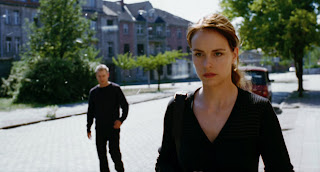 that happen to Yella, the film's main character played extraordinary well by the beautiful Nina Hoss. Not sure of what exactly happens to her and what the symbolic clues mean, as a viewer you are constantly linked to Yella. She's in every scene, making for complete engagement with the character, putting you in her shoes and having only her to count on to figure out what is going on with her. After a life changing event caused by her obsessive husband who since their break-up keeps stalking her, Yella keeps hearing weird sounds, like ducks or a goose and looks almost frightened up to the sky and the branches of a tree, waiting as for something to appear. Getting her life back on track, having just given a new job, time has come for her to move on into a new chapter of her life. However, the past seems to keep following her and strange things keep happening. As a viewer you're startled, trying to understand Yella, with whom you feel emotionally connected to very strongly. Nina Hoss plays Yella brilliantly. The constant look on her face that seems almost empty and beat down, hits you in the gut everytime. You feel her pain, her struggle, her wanting to make piece with the past, do things differently this time around and do it good. After meeting Phillip, played very well by Devid Striesow, who could recently be seen in Die Fälscher, things start to get better and Yella seems to finally have found some kind of succes in life. Still she can't get rid of the demons from her past, which she seems to realise will haunt her all her life through. Petzold pours the story into a structure that at times almost feels claustrophobic. Constantly linked to Yella, as a viewer you can't run away and must confront her demons with her. Some scenes will bring you great suspense and provide for great tension. The ending, which you might had seen coming from the very beginning or at least assumed, clears everything up, but still leaves you with many questions as why Yella stepped into the car of her ex-husband in the first place. Yella is a great film which will please everyone who is very much open for a challenge and something so good you will only find in the more artistic cinema of today's film industry.
that happen to Yella, the film's main character played extraordinary well by the beautiful Nina Hoss. Not sure of what exactly happens to her and what the symbolic clues mean, as a viewer you are constantly linked to Yella. She's in every scene, making for complete engagement with the character, putting you in her shoes and having only her to count on to figure out what is going on with her. After a life changing event caused by her obsessive husband who since their break-up keeps stalking her, Yella keeps hearing weird sounds, like ducks or a goose and looks almost frightened up to the sky and the branches of a tree, waiting as for something to appear. Getting her life back on track, having just given a new job, time has come for her to move on into a new chapter of her life. However, the past seems to keep following her and strange things keep happening. As a viewer you're startled, trying to understand Yella, with whom you feel emotionally connected to very strongly. Nina Hoss plays Yella brilliantly. The constant look on her face that seems almost empty and beat down, hits you in the gut everytime. You feel her pain, her struggle, her wanting to make piece with the past, do things differently this time around and do it good. After meeting Phillip, played very well by Devid Striesow, who could recently be seen in Die Fälscher, things start to get better and Yella seems to finally have found some kind of succes in life. Still she can't get rid of the demons from her past, which she seems to realise will haunt her all her life through. Petzold pours the story into a structure that at times almost feels claustrophobic. Constantly linked to Yella, as a viewer you can't run away and must confront her demons with her. Some scenes will bring you great suspense and provide for great tension. The ending, which you might had seen coming from the very beginning or at least assumed, clears everything up, but still leaves you with many questions as why Yella stepped into the car of her ex-husband in the first place. Yella is a great film which will please everyone who is very much open for a challenge and something so good you will only find in the more artistic cinema of today's film industry.What is it about?
A young woman by the name Yella has just gotten a new job after separating from her husband who promised her things he couldn't live up to. Stalking her since she left him he has received order to keep distance and not get too close. Still he keeps following her getting
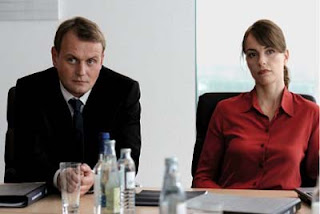 aggressive when she refuses to come with him. Finding some comfort with her father, he tries to help her out lending her some money. She doesn't want it, but her father insists. Ready to get to the train station to travel to her new job, her husband awaits her ouside her father's house. Hearing a sound that seems to be of somekind of plane which is about to crash, she for some reason decides to get in the car with him. Arguing, her husband starts to get violent and Yella wants him to stop the car and get out. He however has other plans, which from then on will cause for an immense shift in Yella's further life.
aggressive when she refuses to come with him. Finding some comfort with her father, he tries to help her out lending her some money. She doesn't want it, but her father insists. Ready to get to the train station to travel to her new job, her husband awaits her ouside her father's house. Hearing a sound that seems to be of somekind of plane which is about to crash, she for some reason decides to get in the car with him. Arguing, her husband starts to get violent and Yella wants him to stop the car and get out. He however has other plans, which from then on will cause for an immense shift in Yella's further life.Final Verdict: ****1/2
Yella is a very strong film keeping you guessing until the very end. At times the film seems to lose some steam, but recovers everytime by bringing up these new twists having characters act on emotion, therefore doing things you do not expect. Even though from the beginning I seemed to already know the outcome of the film and what had really happened, I still found some great pleasure in the way Yella is constructed. Filled with symbolic clues and drawing importance to every small detail, Yella is a mesmerizing piece of work, almost a mosaic of intertwining elements which, when put together, will reveal its bigger meaning. Great is the scene at the beginning where Yella is shown walking down the streets, filmed from the inside of a car, which a short moment after is revealed to be of her ex-husband who then asks her to get in, which she refuses to do. It's a great scene immediately setting up these two character's relationship without expressing it in words. The locations where Yella is filmed is greatly chosen and all fit together very well, giving the film one central feeling and atmosphere.
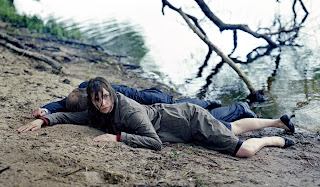 Just the red blouse which Yella wears already strikes you with great pleasure. It's proof of the great choices and makes you aware of the director's talent and proofs he really knows what he does, having put thought into the ways to bring Yella's world to life. Most impressive, still, is Hoss performance which keeps it all together. She is the film's main spill. Without her there wouldn't be a story. Constantly followed, the camera never leaves her, giving Hoss a real challenge. She, however, is perfect for the role, giving way to her inner state impressively well. Looking at her she feels as if she can explode every moment. When seen with her husband you feel she's holding back, resisiting to start yelling and cause a big scene. It's great to watch Hoss get into every corner of Yella's skin. With Yella Christian Petzold has delivered a great icy thriller that will haunt you days after watching it.
Just the red blouse which Yella wears already strikes you with great pleasure. It's proof of the great choices and makes you aware of the director's talent and proofs he really knows what he does, having put thought into the ways to bring Yella's world to life. Most impressive, still, is Hoss performance which keeps it all together. She is the film's main spill. Without her there wouldn't be a story. Constantly followed, the camera never leaves her, giving Hoss a real challenge. She, however, is perfect for the role, giving way to her inner state impressively well. Looking at her she feels as if she can explode every moment. When seen with her husband you feel she's holding back, resisiting to start yelling and cause a big scene. It's great to watch Hoss get into every corner of Yella's skin. With Yella Christian Petzold has delivered a great icy thriller that will haunt you days after watching it.

